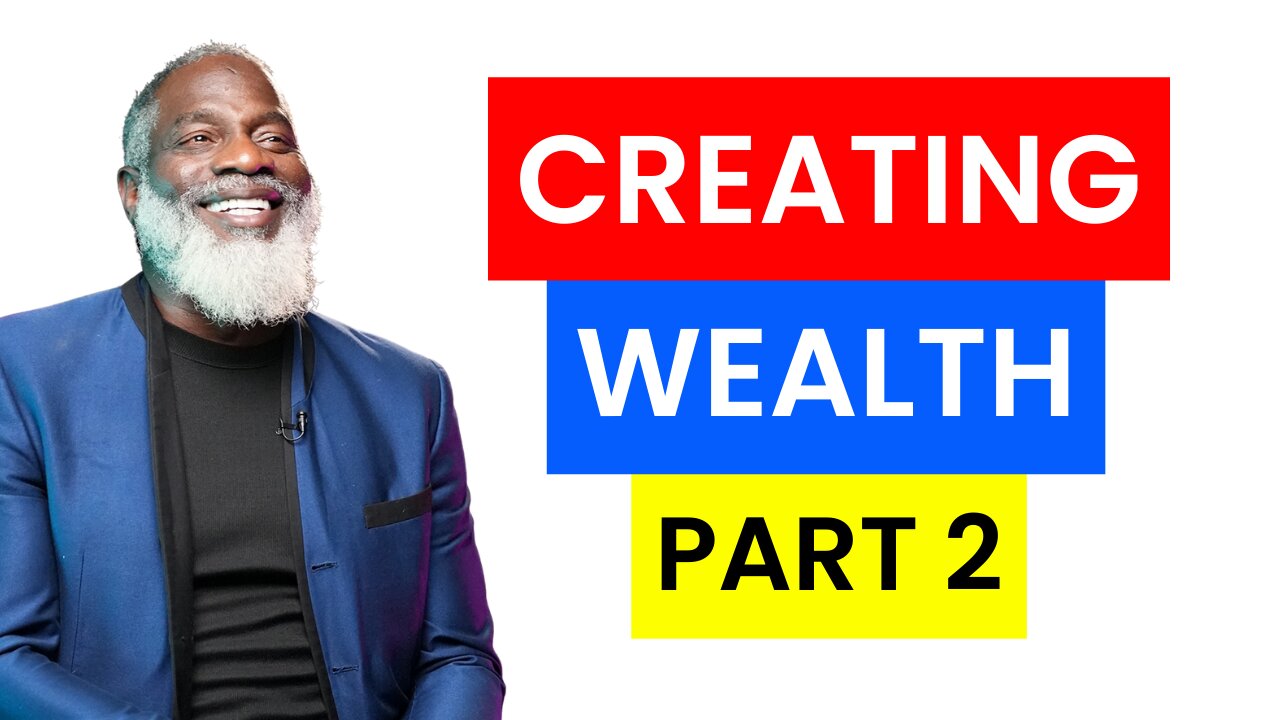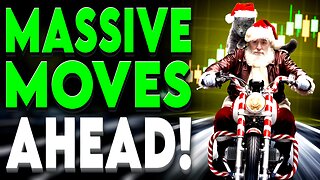Premium Only Content

Creating Wealth: Part 2 | Myron Golden
Creating Wealth: Part 2
| Myron Golden |
0:00 Introduction
The first part we talked about was valuing time more than we valued money. And the reason that's important is because that's what we need to understand. Say we need to understand the difference between cost and value. And I heard it said, and I don't remember who said it, or I would tell you, I'm not gonna take credit for their work, but I heard it said that poor people know the cost of everything and the value of nothing. Rich people know the value of everything and the cost of nothing. And I say everything. I don't mean everything, but I'm talking about items, things that we spend money for. And what you've gotta do is you've gotta become less cost focused and more value focused if you're gonna create wealth.
0:40 2 Ways to Create Wealth
Because I'm gonna tell you, there are two ways to create wealth, and I'm gonna share with you what those two ways are. Then in the third video, I'm gonna show you how to capitalize on those three ways. So here's the deal. So I want you to focus more on value than you do on cost. So here's how the wealth creation formula works: if you want to create wealth, there are two ways to do it.
You can either do H Va x L Vo = W.
Or you can do L Va x H Vo = W. Now those are the two wealth formulas.
I'm gonna tell you what they stand for in a second. But understand that it doesn't matter if we're talking about Bill Gates, if we're talking about Steve Jobs, if we're talking about Sam Walton, if we're talking about Michael Dell, if we're talking about Mark Zuckerberg, the reason these people are able to create massive amounts of wealth in a very short period of time is because they're applying one of these two formulas, or both of them. Now, what do they stand for? Well, H Va stands for high value. High value x low volume. So you can either have a high value product and you sell a few of them. For instance, you may sell airplanes. People who sell airplanes for a living only need to sell two or three of 'em a year, and they make a very, very good living. So high value x low volume = wealth.
But when you want to get into really high values, you could go to some of these new TV shows they have where they're selling million dollar homes, like Million Dollar Listings, which is a real estate agents who focus on all of their energy on selling higher end homes because there's more commission in it.
These are people who understand high value x low volume. They may not sell as many houses as the person who's selling a hundred thousand dollars houses, but they're making more money because it's a higher value. I'm not saying either of these is right or wrong. Sam Walton became the richest man in American history and he did it by the other formula, which is L, low value... so he had low value products. Times high volume. Sam Walton said, "I wanna make my money on the volume."
In fact, he had a motto that he only wanted to make 30% profit on any product that he sold. And if he got a better deal buying the product from one of his vendors, he would pass that savings on to his customers. And Sam Walton built the biggest retail chain in the world based on low value, high volume products. Neither is right or wrong. They are just what they are and you need to pick one.
3:50 Using Both
Or you could pick both. You could say, "I want to do low value, high volume products on the front end, and then do high value, low volume products on the back end." If you don't know what that means, you'll learn what that means as you continue to follow my videos, it'll make more sense to you. So I'm gonna do one or two of these or I'm going to do both. And eventually you might get to a point where some of us have gotten where we've had the ability to do high value products.
And do high volume on high value products, and that's pretty cool. When you can have a high value product and then sell lots of them, man, that is a really great place to be. Now, the reason this formula is so important is because this is how you value your time. Instead of just, "I'm gonna trade an hour of my time for somebody else's $25, I'm gonna trade an hour of my time for somebody else's $50, or I'm gonna trade an hour of my time for somebody else's $100," when you figure out how to bring value into the world and you understand the concept of value, it will give you the ability to create more wealth.
4:50 Why People Don’t Make Money
One of the reasons people don't make much money is because they are doing work in a job that is low value. And I don't mean it's low value, that it's not important. I'm not saying your job's not important, I'm just saying it's only worth what the job it pays and has nothing to do with you or your particular skills. See, you are a genius. You are already worth millions. But the fact is your boss hired you to do a job, and that job is only worth $15 an hour, $25 an hour, $45 an hour, whatever it is you're making, that's a low value proposition. And so you're selling your time to the boss so that while you're at the office, the boss can be at the golf course. And this is just how this works. I'm not attempting to make anybody feel mad at their boss or anything. I'm just telling you this is how it works. Now, I'm gonna ask you a question as we end this module: is it easier to get $20 from somebody, or is it easier to get $20,000 from somebody?
It's not a trick question, it's easier to get $20. Well, guess what? What if you could figure out something that could create $20 worth of value for somebody, and you do that for a thousand people, that's $20,000. Instead of trying to fulfill a job that does $20,000, pays $20,000 a year, and now you're trying to get $20,000 out of one person and that person is your employer.
Find out more at:
https://thelongercrowbar.com/myron-golden
-
 7:31
7:31
The Longer Crowbar
2 months agoRFK Jr. on America's Devolution and the Fight for Freedom
51 -
 1:58:39
1:58:39
Steven Crowder
4 hours agoBREAKING: Why South Korea's Martial Law Really Matters to America
283K198 -
 LIVE
LIVE
Mark Kaye
1 hour ago🔴 CATTURD Goes OFF on Pete Hegseth Haters!
2,523 watching -
 30:14
30:14
Rethinking the Dollar
1 hour agoU.S. Bankruptcy Warning by Elon Musk! | Morning Check-In
9.14K -
 LIVE
LIVE
The Shannon Joy Show
5 hours ago🔥🔥LIVE - Exclusive W/ Dr. Mary Talley Bowden! Shocking New Study On The Kill Shot - Why COVID mRNA Technology MUST BE BANNED Worldwide, #MAHA & More!🔥🔥
397 watching -
 1:02:17
1:02:17
PMG
13 hours ago"Hannah Faulkner and Debbie Bernal | PHIZER WHISTLEBLOWER TO LINE IN THE SAND"
9.33K -
![[Kid Edition] My Sons Want To Take Over My Stream! [Brawlhalla] #RumbleTakeOver](https://1a-1791.com/video/s8/1/O/k/-/n/Ok-nv.0kob-small-Kid-Edition-My-Sons-Want-To.jpg) LIVE
LIVE
CHiLi XDD
2 hours ago[Kid Edition] My Sons Want To Take Over My Stream! [Brawlhalla] #RumbleTakeOver
94 watching -
 1:24:59
1:24:59
Graham Allen
5 hours agoTucker REVEALS “We Are at War With Russia!” + Replace Hegseth With DeSantis?! NO WAY!!
88.6K178 -
 2:02:14
2:02:14
Matt Kohrs
13 hours agoNew Highs Achieved (Options, Crypto & Futures) || The MK Show
44.8K3 -
 1:23:34
1:23:34
Caleb Hammer
3 hours agoTrans Socialist Blames Capitalism For Their Mistakes | Financial Audit
23.5K3